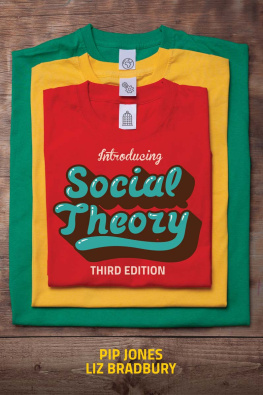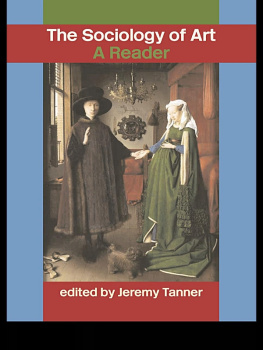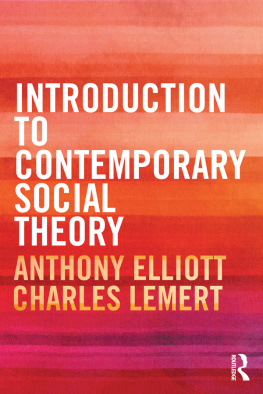Contents
Guide
Pages

In memory of Heather Townsend
INTRODUCING SOCIAL THEORY
Third Edition
PIP JONES AND LIZ BRADBURY
Contributions by Shaun Le Boutillier
polity
Copyright Pip Jones and Liz Bradbury 2018
The right of Pip Jones and Liz Bradbury to be identified as Author of this Work has been asserted in accordance with the UK Copyright, Designs and Patents Act 1988.
First edition first published in 2003 by Polity Press
Second edition first published in 2011 by Polity Press
This third edition first published in 2018 by Polity Press
Polity Press
65 Bridge Street
Cambridge CB2 1UR, UK
Polity Press
101 Station Landing, Suite 300
Medford, MA 02155, USA
All rights reserved. Except for the quotation of short passages for the purpose of criticism and review, no part of this publication may be reproduced, stored in a retrieval system or transmitted, in any form or by any means, electronic, mechanical, photocopying, recording or otherwise, without the prior permission of the publisher.
ISBN-13: 978-1-5095-0508-1
A catalogue record for this book is available from the British Library.
The publisher has used its best endeavours to ensure that the URLs for external websites referred to in this book are correct and active at the time of going to press. However, the publisher has no responsibility for the websites and can make no guarantee that a site will remain live or that the content is or will remain appropriate.
Every effort has been made to trace all copyright holders, but if any have been inadvertently overlooked the publisher will be pleased to include any necessary credits in any subsequent reprint or edition.
For further information on Polity, visit our website: politybooks.com
ACKNOWLEDGEMENTS
Liz would particularly like to thank our editor, Jonathan Skerrett, for his patience and encouragement, and Helen Gray for her thorough and elegant copy-editing. We would both like to thank Shaun Le Boutillier for allowing his work from the second edition to appear here; the anonymous readers whose comments were particularly helpful in shaping this edition of the book; our colleagues at Anglia Ruskin University, particularly Daniel Smith and James Rosbrook-Thompson, and our students, past and present, for giving us the chance to discuss and develop our ideas with them. Thanks also to Jan Haynes and Helen Grantham for helping prepare early drafts, and also to Cammie Townsend for reading through later drafts. Liz would like to thank Jane McCann, Clare Bacchus, Jamie Le Boutillier and her parents, for their respective but not mutually exclusive supplies of wisdom, friendship, bad jokes, chocolate and a modicum of affection.
AN INTRODUCTION TO SOCIOLOGICAL THEORIES
Introduction
Humans are social beings. Whether we like it or not, nearly everything we do in our lives takes place in the company of others. Few of our activities are truly solitary and scarce are the times when we are really alone. Thus the study of how we are able to interact with one another, and what happens when we do, would seem to be one of the most fundamental concerns of anyone interested in human life. Yet strangely enough, it was not until relatively recently from about the beginning of the nineteenth century onwards that a specialist interest in this intrinsically social aspect of human existence was treated with any seriousness in Europe. Here, before that time, and even since, other kinds of interests have dominated the analysis of human life. Two of the most resilient, non-social approaches to human behaviour have been naturalistic (see Glossary naturalism (1)) and individualistic explanations.
Rather than seeing social behaviour as the product of interaction, these theories have concentrated on the presumed qualities inherent in individuals. On the one hand, naturalistic explanations suppose that all human behaviour social interaction included is a product of the inherited dispositions we possess as animals. We are, like animals, biologically programmed by nature. On the other hand, individualistic explanations baulk at such grand generalizations about the predictability of behaviour. From this point of view we are all individual and different. Explanations of human behaviour must therefore always rest ultimately on the particular and unique psychological qualities of individuals. Sociological theories are in direct contrast to both of these non-social approaches. Looking a little closer at them, and discovering how they might be incomplete, makes it easier to understand what sociological theories can offer.
Naturalistic theories
Naturalistic explanations of human activity are common enough. For example, in societies of the global North it is often argued that it is only natural for a man and a woman to fall in love, get married and have children. It is equally natural for this nuclear family to live as a unit on their own, with the husband going out to work to earn resources for his dependants, while his wife, at least for the early years of her childrens lives, devotes herself to looking after them to being a mother. As they grow up and acquire more independence, it is still only natural for the children to live at home with their parents, who are responsible for them, at least until their late teens. By then it is only natural for them to want to leave the nest, to start to make their own way in the world and, in particular, to look for marriage partners. Thus they, too, can start families of their own.
The corollary of these natural practices is that it is somehow unnatural not to want to get married, or to marry for reasons other than love. It is equally unnatural for a couple not to comprise a man and a woman, or not to want to have children, or for wives not to want to be mothers, or for mothers not to want to devote their lives exclusively to child-rearing. Though it is not right or natural for children to leave home much younger than eighteen, it is certainly not natural for them not to want to leave home at all in order to start a family of their own. However, these unnatural desires and practices are common enough in these societies. There are plenty of homosexual couples and people who prefer to stay single, or marry with an eye on the main chance. There are plenty of women who do not like the idea of motherhood, and there is certainly any number of women who do not want to spend their lives solely as wives and mothers. Likewise, there are plenty of children who want to leave home long before they are eighteen, while there are also many who are quite happy to stay as members of their parents households until long after that age.
Why is this? If human behaviour is, in fact, the product of a disposition inherent in the nature of the human being then why are such deviations from what is natural so common? We can hardly put the widespread existence of such unnatural patterns of behaviour down to some kind of large-scale, faulty genetic programming. In any case, why are there so many variations from these notions of normal family practices in other kinds of human societies? History provides us with stark contrasts in family life. In his book on family life in medieval Europe, Centuries of Childhood (1973), Philippe Aris paints a picture of marriage, the family and child-rearing which sharply contradicts our notions of normality. Families were not then, as they are for us today, private and isolated units, cut off socially, and physically separated from the world at large. Families were deeply embedded in the community, with people living essentially public, rather than private, lives. They lived in households whose composition was constantly shifting: relatives, friends, children, visitors, passers-by and animals all slept under the same roof. Marriage was primarily a means of forging alliances rather than simply the outcome of love, while women certainly did not look upon mothering as their sole destiny. Indeed, child-rearing was a far less demanding and onerous task than it is in our world. Children were not cosseted to anywhere near the extent we now consider right. Many more people both other relatives and the community at large were involved in child-rearing, and childhood lasted a far shorter time than it does today. As Aris puts it, as soon as he [






